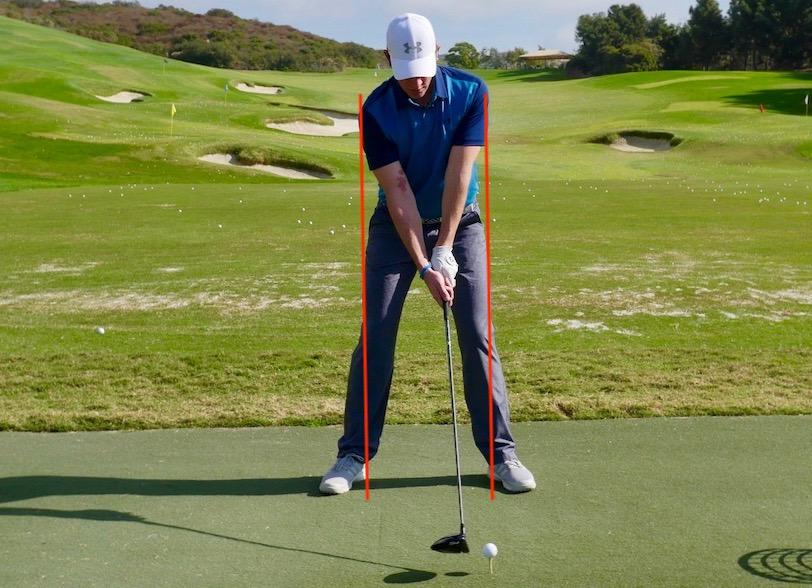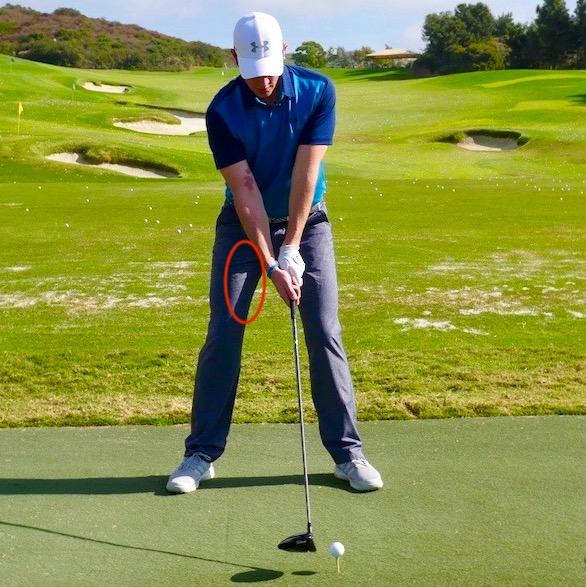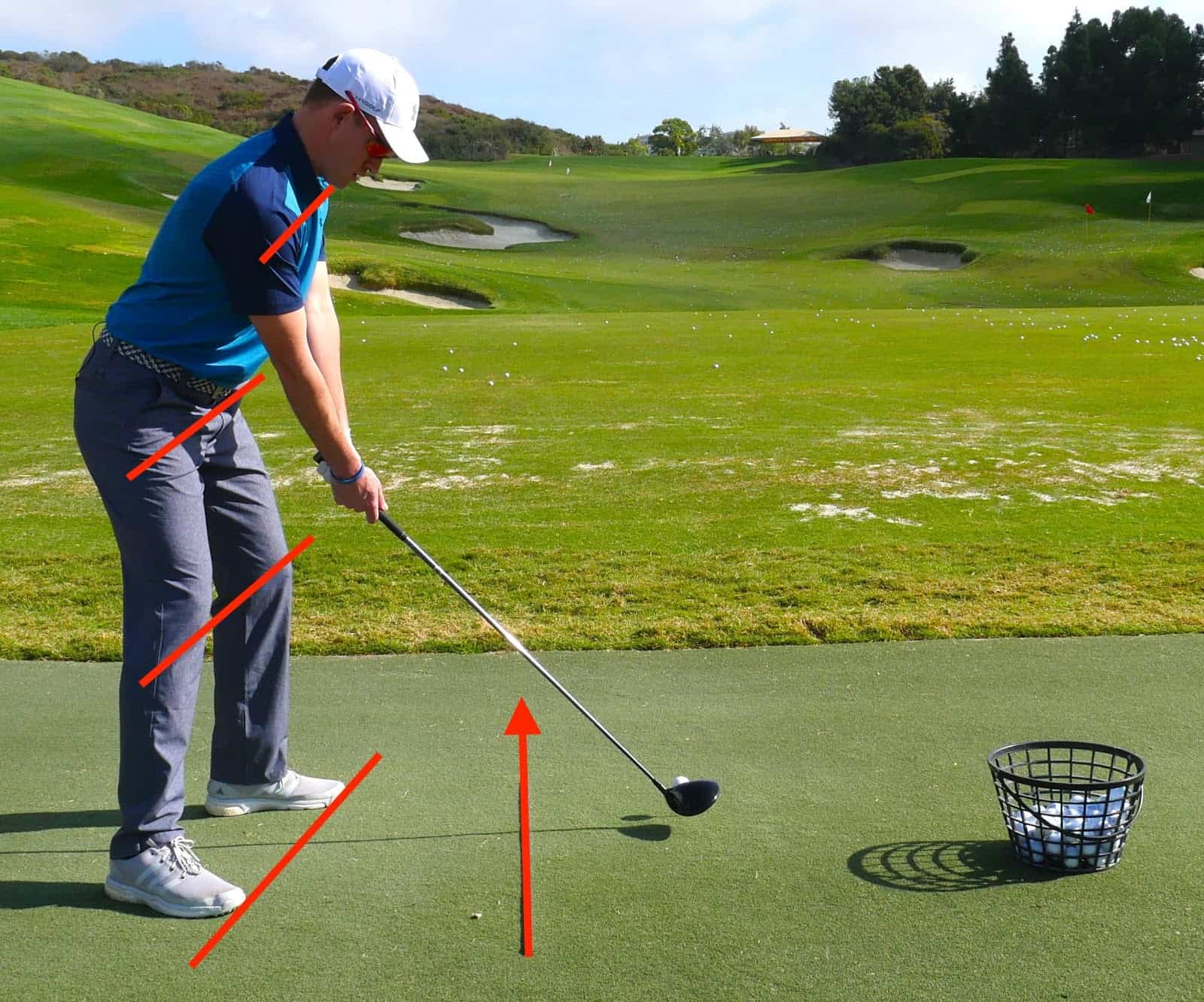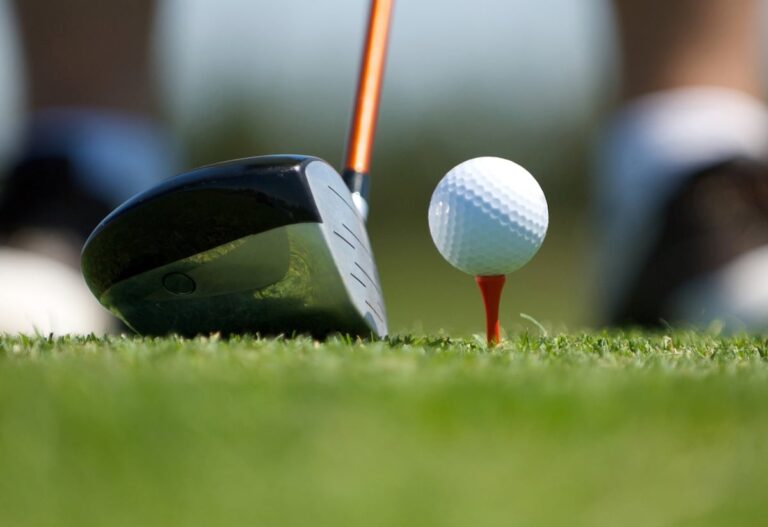
Driving distance and accuracy… the two things that every golfer on the planet wants more of.
Sure, we all know that putting is the key for success at the professional level, but as a recreational player, you want to have the confidence to step up to the first tee and smash a drive down the middle of the fairway.
There are many different ways to gain distance and hit more fairways, but the reality is simple. Once you master the basic concepts of solid ball striking, you have to increase your clubhead speed in order to increase your distance.
If your driving of the golf ball is something that frustrates you, you’re in luck, you have now found the ultimate resource for golf driving tips to help you hit longer, straighter, and more consistent drives.
Here are the 20 golf driving tips that will instantly help you gain more precious yards off the tee:
1. Widen Your Stance

There is a reason you can swing your driver faster than any other club in your bag. Simply put, the driver is the longest club in your bag and therefore has a larger swing arc which results in more speed.
It’s important to remember that you will swing the driver faster than any other club and therefore need a solid base for your swing. Set up so the outside of your shoulders extend down to the inside of your feet at address. This will ensure you have a solid enough base to swing the club in balance and with authority when you start to increase your clubhead speed.
2. Tilt Your Spine

Although the basic elements of the iron and driver swing are the same there is one aspect that is completely opposite between the two shots.
With an iron swing the ball is on the ground and we must strike “down” on the golf ball. With the driver, the ball is placed on a tee and therefore we must do the opposite and hit “up” on the ball. Notice in the position above how the left shoulder is slightly higher than the right shoulder. This is a result of a slight tilt of the spine at address.
The purpose of the spine tilt is put the player in a position to hit up on the golf ball, a key element that you should focus on when increasing driver distance.
3. Use More Loft

What loft do you currently use on your driver?
After working with thousands of amateurs over the years, we have found a direct correlation with driver loft and ego. Players with the biggest egos tend to have the smallest amount of loft on their driver.The reason? People think that the lower the loft of their driver the more powerful of a player they are.
While it’s true that some of the long drive competitors use driver lofts under 6 degrees, the vast majority of PGA Tour players, the most elite group of golfers on the planet, are using more and more loft every year on their drivers.
Due to advancements in technology, we know now the most efficient way to “launch” a ball is with high loft, low spin and hitting up on the golf ball. Dustin Johnson, one of the most powerful drivers of the golf ball on the PGA Tour uses an 11-degree driver!
No wonder he hits those towering tee shots that carry well over 300 yards. Most of the drivers today come with adjustable faces giving players a range of about 4 degrees of loft to experiment with.
Next time you go to the range bring your adjustment tool and start to experiment with a higher loft, it just might be the key to unlocking a few extra yards.
4. Train With a Lighter Club

The average clubhead speed of a PGA Tour player using a driver is 113mph, while the average 15 handicap is 93mph.
In order to increase distance, one must narrow this gap and begin to swing the club faster. One of the most effective ways to train speed in your golf swing is to swing a lighter club. Your body is composed of both fast twitch and slow twitch muscles that when activated are both important parts in the golf swing. Swinging a lightweight club will allow you to activate the fast twitch muscle fibers in your body.
The best tool we’ve found to do this (after trying nearly all of them) is the SuperSpeed training system. It includes 3 specifically-weighted training clubs, nearly 2 years worth of online video instruction and is used by more than 600 tour pros worldwide, including Phil Mickelson.
If you don’t want to use the SuperSpeed system you can practice by taking an alignment stick and swinging it as fast as you can from your normal golf stance. When practice this drill focus on creating a loud “swoosh” sound with the club after impact as you focus on accelerating as fast as you can in the downswing.
Top pick

SKLZ Golf Alignment Sticks Training Aid with 3 Sticks
Three durable, 48-inch fiberglass rods for developing consistent alignment and proper swing mechanics. Creates a consistent alignment routine during pre-swing setup. Each rod features 9 rings for precise setup, ball alignment and ball- striking. Versatile training tool – use for full swing, short game, putting and set-up. Rubber safety cap on one end; pointed on the other end to easily stick into the ground
Buy on Amazon
5. Train With a Heavier Club
While swinging a lighter club is an excellent way to practice building speed, practicing the complete opposite is also beneficial.
The SuperSpeed training system includes a club designed to be 5% heavier than a driver for this exact reason.

If you want to try to recreate this without the system grab two irons from your bag and perform practice swings holding the two clubs together. Swinging two clubs together will be substantially heavier than the alignment stick you just used and will further train your fast twitch muscle fibers. We recommend switching back and forth between both heavy and light weight clubs to further develop these important muscles or following the prescribed trainings from SuperSpeed’s system.
After time, your muscles will begin to develop strength by swinging the heavier club and you will be able to increase your clubhead speed.
6. Get to the Gym

Look at the top of every PGA Tour leaderboard each week and you’ll find the best players in today’s game are all strong athletic specimens of power.
Tiger Woods brought a new generation of golfers to the game and with it the realization that fitness is an important part in hitting the ball great distances. Exercise is an important part of daily life as a human being, but it is also important as a golfer.
While there are some very specific exercises that directly benefit the golf swing (we’ll cover that later) starting any type of exercise program that will improve your overall fitness will have direct benefits to your distance off the tee.
7. Establish Width Early in the Swing

Look at the classical swing of Ben Hogan and notice how much space he creates in the beginning of his swing.
We mentioned earlier that you can swing the driver the fastest speed because it is the longest club and therefore creates the widest swing arc. Continuing with the theme that width equals power, it’s important that your initial takeaway is one that gets the body turning and your hands extending away from the body.
Many amateurs initiate their hands too early in the swing by lifting the club with a “cocking” motion of the wrists. Copy the long hitters of today and practice a slow, wide takeaway with little wrist cock. As you start your swing, imagine the buttons on your shirt rotating backwards while your hands extend away from your body. This will encourage you to use more of your body to hit the ball instead of leading with the hands.
8. Implement a Stretching Routine

We mentioned earlier the importance of adding a gym routine to your weekly routine, however one of the most overlooked exercises for golfers is the simple habit of stretching.
As you age, your strength will decrease over time, this is not a theory but a fact. The best way to combat this loss of strength is to maintain a high level of flexibility. Being able to touch your toes, rotate your shoulders as close as you can to 90 degrees, and perform a deep squat are all important exercises that golfers should be practicing all the time.
The key with stretching is to make it a part of your daily routine. Start by using the first five minutes of each morning to practice these basic golf stretches. You will start to see amazing results after just 7 days. Keep it up for an entire month and you will be blown away by the results!
9. Practice with a Launch Monitor
![]()
There is a reason why more and more PGA Tour players bringing mobile launch monitors with them to every golf tournament. The best players in the world need to know their exact numbers and pay close attention to spin rates, launch angles, clubhead speed and smash factor. While we don’t think it’s necessary for you to go out and purchase your own launch monitor, if you have never spent time on one it’s a great tool to use to better understand your own swing dynamics.
Visit your favorite retail golf shop (stores like Golf Galaxy and Dick’s Sporting Goods allow patrons to access their launch monitors to demo new equipment) and bring in your current set and ask to compare them with the newer equipment. You don’t need to purchase anything, but this will allow you to see your important numbers like your clubhead speed, spin rate, and launch angle.
However, if you are interested in purchasing a launch monitor that you can bring with you anywhere the one we most often recommend is the FlightScope Mevo. It’s the most portable launch monitor on the market, connects to your phone and is used by some of the best drivers on the PGA tour (including Bryson DeChambeau):

FlightScope Mevo
Mevo provides accurate real-time performance data to help you train and improve with every club in the bag, whether on the range, on the course, or in your home. Practice indoor or outdoor with data parameters that include carry distance, club head speed, ball speed, smash factor, vertical launch angle, spin, apex height and flight time.
Buy on Amazon
10. Decrease Your Spin Rate
Most amateurs suffer from excessively high spin rates. There can be a variety of reasons for spin rate problems but one of the most common is a downward strike on the ball that puts excess backspin on the shot. We can’t stress the importance of “hitting up” on the golf ball with a driver and will make the point again. If you are using an iron setup to hit your driver (golf ball in the middle of your stance, flat shoulders, ball teed up too low) you will strike down on the ball and hit the type of shot that balloons in the air and loses valuable distance.
The longest drivers hit the golf ball with a high launch and low spin. Their spin rates average between 1,800-2,300 rpm (revolutions per minute). Again, using a launch monitor is a great way to see where your current spin rate is and get instant feedback on each swing. Anything above 2,800rpms and you no doubt are giving up valuable yardage.

You should feel a little more pressure on the inside of your right thigh.
We’ve mentioned the importance of “hitting up” on the golf ball with your driver and one of the best ways to encourage this action is to set up with slightly more weight on your trail foot at address.
Take your stance and begin with your weight evenly distributed between both feet. The ball position should be forward in your stance and your spine slightly tilted away from the target. For the right-handed golfer, slightly shift your body until you feel about 60% of your weight is loaded into your right glute. Having a slight amount of weight on the trail foot ensures that you can stay back and deliver that powerful upward strike into the ball.
12. Practice Bad Posture

Don’t worry that’s not a typo! If you struggle with hip mobility, practice arching your back like a cat (left photo) to relax your shoulders and level your hips. It may not look pretty, but it will definitely allow you to rotate your hips more. This is an especially helpful tip for those seniors golfers looking to unlock a few yards.
Not yet a senior golfer? Practicing the “arching cat” posture in the left photo is still a good drill to use. Curl your back up and then let it relax and you can find yourself in a more neutral posture (right photo) that will achieve the same goals.
13. Eliminate Early Extension

One of the most common problems we see in a variety of players from the PGA Tour level to nearly every amateur over a 15 handicap is a problem called “early extension”. Early extension occurs when a player’s hips thrust toward the golf ball in the downswing rather than rotating and turning around. The reason Early Extension is such a common problem for many golfers is that eliminating it for your golf swing requires a certain range of flexibility.
Luckily if you can successfully learn the Overhead Deep Squat, you can learn to eliminate Early Extension. To perform the exercise, grab a golf club and hold it with both hands, shoulder width apart directly above your head. Get into an athletic setup position and perform a standard squat while keeping your back straight and golf club above your head. Your overhead deep squat is considered a success if you meet the following four conditions:
The golf club does not pass your head as you squat
Both heels remain on the floor
Knees do not pass in front of the toes
Thighs break parallel to the ground
As we mentioned earlier, we feel this movement is so important for the golfer that you should include it on your daily stretching routine to help improve your body’s health and your golf swing.
14. Raise Your Left Heel

You can significantly gain more shoulder turn by simply raising the left heel.
One of the best tips that can instantly transform your backswing dynamics involves a simple raise of the left heel in the backswing.
Spend some time watching the classical swings of Bobby Jones, Sam Snead, Ben Hogan, Arnold Palmer, Jack Nicklaus, and Tom Watson and you will notice that each of these players raise their left heel in the backswing. Raising the left heel directly benefits your swing as it allows your hips more flexibility to rotate more in the backswing, and it also allows the shoulders to turn more in the backswing.
15. Pull your Pocket

Pretend someone is standing behind you and “pulling” your right pocket backward to engage your hips more.
One of the most common mistakes we see with players is a lateral shift in the backswing. This movement, also referred to as swaying, is an immediate distance killer in the golf swing. If your hips are swaying they can’t rotate, and without the rotation of your hips your swing will lack some major power. Greg Norman used to use the swing thought of “right pocket back” to start his backswing.
If you have trouble sliding and swaying your hips in the backswing, take your setup position and feel as if someone is pulling your right pocket directly backward to start your backswing.
16. Turn Your Head in the Backswing
One of the best ways to reduce tension and increase your turn in the backswing is allowing your head to tilt slightly in the backswing.
This was a staple move in the full swing of Jack Nicklaus and became the “trigger” for his golf swing allowing him to start his backswing by the tilting of his head. If you’re struggling with excessive tension in your neck try the following drill:
Setup in a normal golf stance with your club of choice
For a right-handed golfer, slowly rotate your head counter-clockwise while keeping your left eye focused squarely on the ball
This tilting of the head should happen at the same time you initiate your backswing.
This is a very subtle move. You only need to tilt the head about an inch to release the tension in your neck and allow your shoulders to turn more freely. Start with slow practice swings and then start hitting balls with this new move.
17. Preset your Hips

If you suffer from a lack of flexibility with your hips and shoulders, you need to think outside-the-box and find creative ways to allow your body to turn more. The more you can rotate your shoulders and hips in the backswing, the more potential energy you can create.
One of the best methods involves presetting your hips and shoulders by dropping your trail foot back at address. With the trail foot now behind, you will find it much easier to rotate and make a complete turn to the top. In addition, this setup position will encourage a more inside takeaway and help you approach the ball from the inside leading to a powerful draw off the tee.
18. Practice on an Uphill Lie
One of the best ways to practice your perfect setup position for your driver is to find a gentle upslope at your driving range and perform some practice swings on the slope. Most amateurs make their first mistake with their driver at the setup. With the ball on a gentle upslope you will easily be able to experience a correct drive setup.
Setup up your shoulders parallel to the upslope and you will feel your spine slightly tilt away from the target, your weight slightly favoring your trail foot, and the ball position clearly forward in your stance, all the correct variables to hit the ball a long distance.
19. Hold Your Finish

Have you ever noticed the amazing balance that even the longest drivers on the PGA Tour have in their swing?
One of our favorites to watch is the 2017 PGA Tour Player of the Year, Justin Thomas. The long hitting star swings the club well in excess of 125mph but seems to finish every swing in perfect balance. If you can hold your position at the end, you will be much more likely to:
Have a more square clubface at impact
Approach the ball with a proper swing path
Establish a consistent rhythm in your swing
Start your next practice session by hitting 5 consecutive shots and hold the finish for a minimum of 3 seconds afterwards. Once you’ve mastered that drill, incrementally increase your speed while making sure you finish in a balanced position.
20. Swing Left Handed
If you wanted to be a bodybuilder would you go to the gym and only work out one side of your body? Of course not, balance between all muscles is the key to successful bodybuilding. For the body builder their right and left legs, arms, shoulders, and other body parts should be equal between both sides.
Most golfers never even think about training their non-dominant side, but in an effort to create more balance and power, professionals are spending a significant time in the gym, throwing, catching, and performing speed swings with BOTH sides of their body. One of the key fundamentals in training speed is to be able to swing a lightweight club approximately the same speed between both sides.
Practice training your non-dominant side with an alignment stick. At first you will be noticeable slower, make it a goal to get your non-dominant swing speed within 5% of your dominant swing speed and you’ll achieve the balance and power that will lead to longer drives.
The best swing speed training programs (like the one mentioned below) will always insure you’re equally training both sides of your body:

Use these tips and start hitting longer, straighter, and more consistent drives…
There’s nothing stopping you from improving your driving. Head to the range with these driving tips and wear them out! Commit at least 1 hour per week implementing these tips you’ll be smashing beautiful drives in no time.
Get the confidence to KNOW you are going to hit the fairway. There’s no reason why you can’t be a great driver of the golf ball and improve your game drastically.
You control whether or not you improve your driving. Put the time in and reap the rewards.

